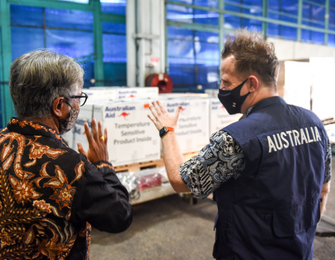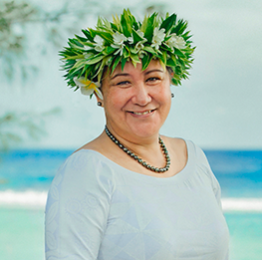This article by Australia's Ambassador for Regional Health Security Dr Stephanie Williams was republished on the Public Health Association Australia's website on 23 December 2021.
In 2021, the initial shocks of the COVID-19 pandemic and vaccine development race gave way to new variants and outbreaks that challenged our regional neighbours and the world. These events reiterated the importance of effective national vaccination campaigns alongside ongoing public health responses to COVID-19.
This year, Australia continued to work closely with governments and other key actors in the Indo-Pacific with the goal of bringing the acute phase of the pandemic to an end, protecting lives, and rebuilding economies.
Australia has now shared more than 12 million doses of COVID-19 vaccines with its neighbours in the Indo-Pacific, and remains committed to share up to 60 million doses—40 million from Australia’s supply, and 20 million procured for partners through UNICEF—by the end of 2022. We partnered with 18 regional countries to help develop tailored plans based on vaccine delivery support needs.

But even the best laid plans must rapidly adapt when new threats emerge. As the Delta strain made its way through our region, triggering major outbreaks in Indonesia, Fiji, Vietnam and Papua New Guinea, Australia responded. Omicron is now posing new challenges. Again, Australia is ready to help.
In support of Indonesia’s COVID-19 response this year, Australia has shared over 5.6 million vaccine doses as part of our total commitment of 20 million vaccine doses for Indonesia — 10 million of which is from our own supply. We have also delivered $12 million in medical equipment and over 30,000 rapid antigen test kits.
In addition to vaccine deliveries, our $101.9m package for Indonesia under Australia’s regional Vaccine Access and Health Security Initiative, is providing essential vaccine delivery support to Indonesia. Activities are provided through our bilateral health program, the Australia Indonesia Health Security Partnership, as well as through Indonesia’s multilateral partners, including UNICEF, the World Bank and the World Health Organisation, to assist on issues including risk communications, supply chains, cold chain management and genomic sequencing, and supporting provision of essential staff such as vaccinators.
More than 70% of Indonesia’s eligible population has now received one dose of the vaccine, and over 50% have received two doses—no small feat in a country of more than 270 million people. Daily deaths and case numbers have dropped substantially since the peak of the July outbreak, as vaccination and other public health measures have demonstrated their impact.
For Fiji, the stakes were high. Already struggling with the economic impacts of closed borders on the country’s tourism industry, which accounted for almost 40% of GDP before the pandemic, the country went into lockdown as Delta cases and deaths climbed. But concerted government and community efforts to roll out vaccinations nationally, with Australia’s support, has seen Fiji’s double dose vaccination rate climb above 91% for the eligible adult population, with 97% of adults over 18 having received one dose.
Australia deployed three Australian Medical Assistance Teams (AUSMAT) with embedded New Zealand health specialists to help the Fijian medical system contain the outbreak. Additionally, more than 1 million Australian-shared doses were delivered to Fiji this year, along with COVID-19 testing equipment, oxygen concentrators, three ambulances, and some 91 tonnes of PPE, laboratory and medical supplies.
This month, the monumental efforts of Fijian health workers to vaccinate the nation were rewarded when international tourists returned to Fiji for the first time since the beginning of the pandemic to an airport filled with joyful singing and dancing. This would not have happened so quickly if it were not for the strong partnerships already in place through Australia’s pre-COVID Health Security Initiative (with funding of $300 million over five years from October 2017) and additional support from the Australian Government’s Vaccine Access and Health Security Initiative announced in October last year ($523 million over three years). Our contribution to the Quad Vaccine Partnership with the US, Japan and India, $100 million in 2021-22 for Southeast Asian partner countries, has further extended our support for vaccine access in the region.
Harnessing the world-class expertise and knowledge within Australia’s public health institutions for the benefit of our region has been a distinctive feature of our regional COVID-19 response.
For example, trusted advisors deployed by Australia’s National Centre for Immunisation Research and Surveillance have worked closely with government, donors and other partners to support Ministry of Health planning and implementation of the COVID-19 vaccine deployment in Timor-Leste.
The Therapeutic Goods Administration (TGA) has advised counterpart regulatory agencies and tested every batch of vaccines deployed to the region from our national supplies, ensuring they meet the highest standards for quality, efficacy, and safety. These collaborative partnerships build trust, share knowledge, and support a more health-secure region for all.
Yet challenges remain. Very real geographic, logistical, and capacity-related constraints in the region mean that some countries continue to lag behind in achieving vaccination goals. Combined with this, we have seen the dangerous impacts of online misinformation, particularly in Papua New Guinea.
To counter this, Australia’s $89.9 million support for the vaccine rollout in PNG focuses on communications, including government information campaigns, training to combat vaccine hesitancy among health workers, and engagement with community leaders. By supporting NGOs, civil society and the media to share factual information with communities, and working with tech companies to reduce the spread of misinformation, we hope to support Papua New Guineans to make informed choices on vaccination.
These efforts form part of a broader approach to vaccine confidence across the region, again enabled by our deep relationships, partnerships and trusted public health expertise.
As we look towards an uncertain 2022, Australia will continue to focus on vaccine delivery, particularly in under-vaccinated Pacific countries. As an early investor in the COVAX Advance Market Commitment (AMC), we will continue our support to global vaccine access mechanisms and use our position on the international stage to advocate for vaccines for all.
Crucially, we will continue to emphasise the need to think beyond vaccines alone when it comes to protecting our communities from new outbreaks or variants. Preparedness, partnership, health system support, and responsive, evidence-based public health measures are also essential.
Vaccination is a key element we are relying on to combat the pandemic—but if we lose our focus on other fundamentals of infectious disease prevention and control, we risk forgetting the difficult lessons that COVID-19 has taught us, and leave ourselves, and our region, exposed to future risks.
Image shows Indonesian official and an Australian Government official marking the arrival of Astra Zeneca COVID-19 vaccines in Indonesia from Australia. Credit: Australian Embassy, Jakarta/Flickr



